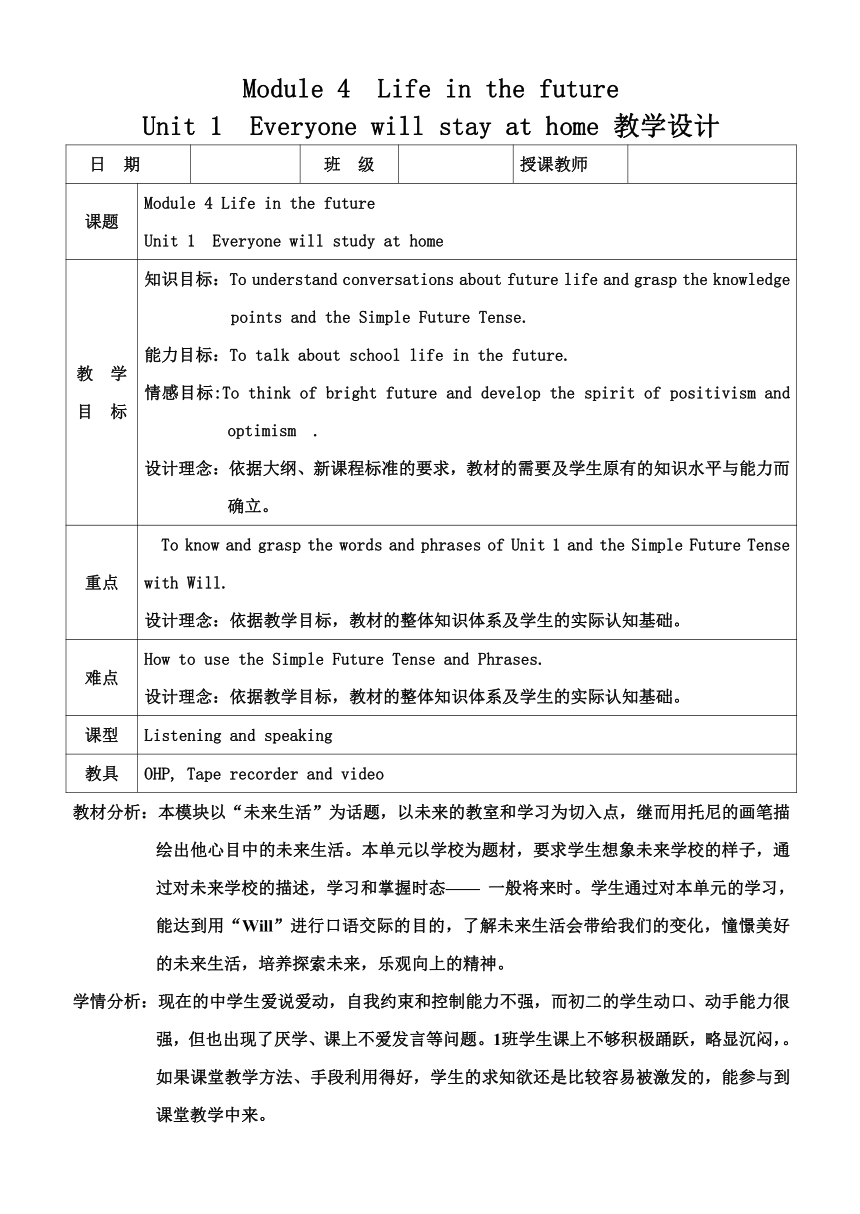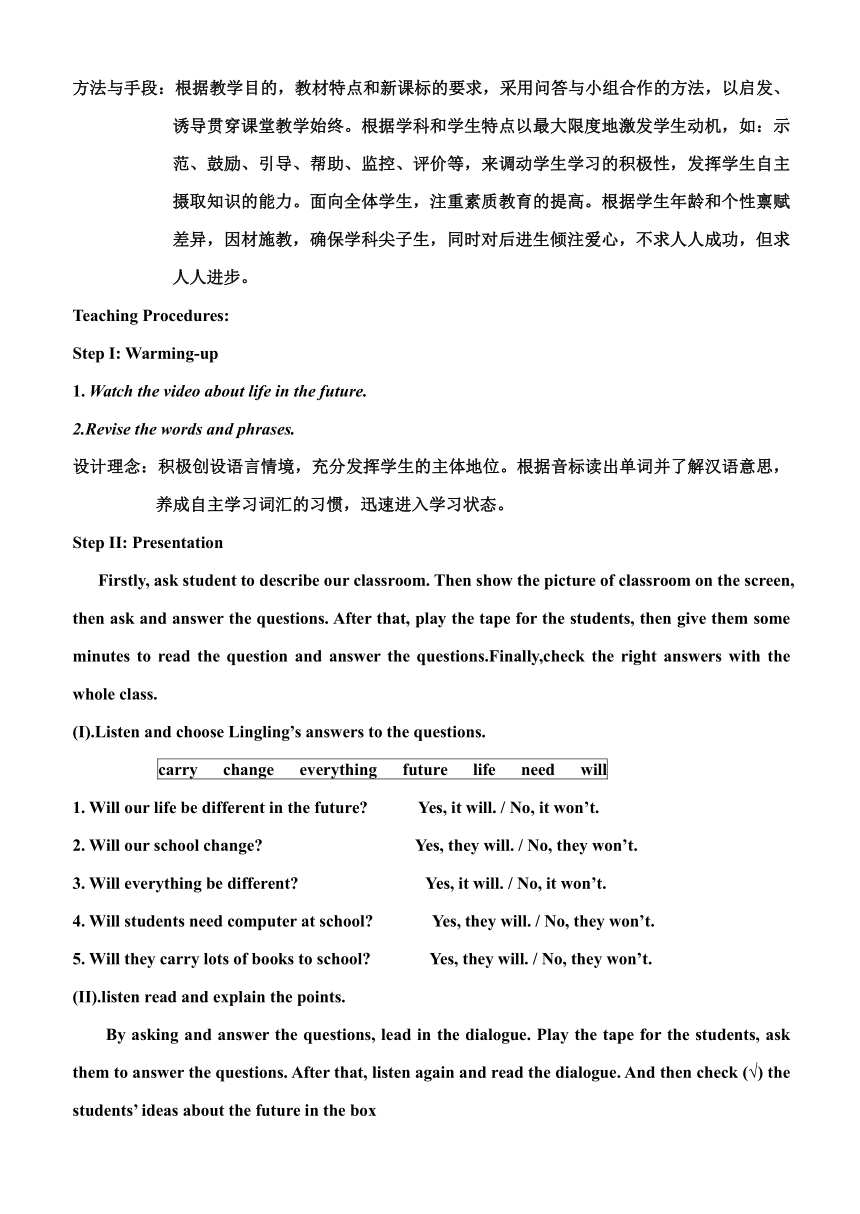外研版英语七年级下Module 4 Life in the future Unit 1 Everyone will study at home教案(1课时)
文档属性
| 名称 | 外研版英语七年级下Module 4 Life in the future Unit 1 Everyone will study at home教案(1课时) |  | |
| 格式 | doc | ||
| 文件大小 | 52.0KB | ||
| 资源类型 | 教案 | ||
| 版本资源 | 外研版 | ||
| 科目 | 英语 | ||
| 更新时间 | 2022-04-19 23:03:11 | ||
图片预览


文档简介
Module 4 Life in the future
Unit 1 Everyone will stay at home 教学设计
日 期 班 级 授课教师
课题 Module 4 Life in the future Unit 1 Everyone will study at home
教 学 目 标 知识目标:To understand conversations about future life and grasp the knowledge points and the Simple Future Tense.能力目标:To talk about school life in the future.情感目标:To think of bright future and develop the spirit of positivism and optimism . 设计理念:依据大纲、新课程标准的要求,教材的需要及学生原有的知识水平与能力而确立。
重点 To know and grasp the words and phrases of Unit 1 and the Simple Future Tense with Will.设计理念:依据教学目标,教材的整体知识体系及学生的实际认知基础。
难点 How to use the Simple Future Tense and Phrases.设计理念:依据教学目标,教材的整体知识体系及学生的实际认知基础。
课型 Listening and speaking
教具 OHP, Tape recorder and video
教材分析:本模块以“未来生活”为话题,以未来的教室和学习为切入点,继而用托尼的画笔描绘出他心目中的未来生活。本单元以学校为题材,要求学生想象未来学校的样子,通过对未来学校的描述,学习和掌握时态—— 一般将来时。学生通过对本单元的学习,能达到用“Will”进行口语交际的目的,了解未来生活会带给我们的变化,憧憬美好的未来生活,培养探索未来,乐观向上的精神。
学情分析:现在的中学生爱说爱动,自我约束和控制能力不强,而初二的学生动口、动手能力很强,但也出现了厌学、课上不爱发言等问题。1班学生课上不够积极踊跃,略显沉闷,。如果课堂教学方法、手段利用得好,学生的求知欲还是比较容易被激发的,能参与到课堂教学中来。
方法与手段:根据教学目的,教材特点和新课标的要求,采用问答与小组合作的方法,以启发、诱导贯穿课堂教学始终。根据学科和学生特点以最大限度地激发学生动机,如:示范、鼓励、引导、帮助、监控、评价等,来调动学生学习的积极性,发挥学生自主摄取知识的能力。面向全体学生,注重素质教育的提高。根据学生年龄和个性禀赋差异,因材施教,确保学科尖子生,同时对后进生倾注爱心,不求人人成功,但求人人进步。
Teaching Procedures:
Step I: Warming-up
1. Watch the video about life in the future.
2.Revise the words and phrases.
设计理念:积极创设语言情境,充分发挥学生的主体地位。根据音标读出单词并了解汉语意思,养成自主学习词汇的习惯,迅速进入学习状态。
Step II: Presentation
Firstly, ask student to describe our classroom. Then show the picture of classroom on the screen, then ask and answer the questions. After that, play the tape for the students, then give them some minutes to read the question and answer the questions.Finally,check the right answers with the whole class.
(I).Listen and choose Lingling’s answers to the questions.
carry change everything future life need will
1. Will our life be different in the future Yes, it will. / No, it won’t.
2. Will our school change Yes, they will. / No, they won’t.
3. Will everything be different Yes, it will. / No, it won’t.
4. Will students need computer at school Yes, they will. / No, they won’t.
5. Will they carry lots of books to school Yes, they will. / No, they won’t.
(II).listen read and explain the points.
By asking and answer the questions, lead in the dialogue. Play the tape for the students, ask them to answer the questions. After that, listen again and read the dialogue. And then check (√) the students’ ideas about the future in the box
(III):Complete the passage of the Activity 4 with the correct form of the words and expression from the box.
able any more free level maybe need question telephone
Betty: We’ll always (1) _____ teachers because computers will never be (2) _____ to check the students’ (3) ______ and answer their (4) ________ by (5) __________ or Internet. Will students need to go to school (6) __________ Yes, (7) ________ they will, because school is good fun, but everyone will have lots of (8) ______ time.
(IV):Explain and study the important and difficult points.
Step III: Do exercise on the screen.
设计理念:采用启发和诱导的发法,借助多媒体演示文稿,让学生真正领会所学知识,由潜入深突破难题,抓住重点,达到学以致用并体会学习的乐趣。
Step IV: Summary
Have a student sum up this lesson.
设计理念:充分发挥学生的主体地位,并对本节课知识形成完整印象。
Step V: Homework:
1.Review and recite the important points of Unit 1.
2.Finish the exercise book and prepare for the next lesson.
3.Describe the classroom in the future.
设计理念:将所学知识融入本节内容,新旧联系,巩固提升。
Written on the B.b.
Module 4 Life in the future
Unit 1 Everyone will study at home
词汇:chalk ruler carry change by future life need maybe will(would)
ask level free able more question everything
短语: in the future in future
on the Internet be able to
by email not... any more
study at home free time
check the students’ level
make friends in+一段时间
语法:一般将来时态
意义:描述未来的事情或表达对将来的预测
构成:主语后“will + 动词原形”
常用时间状语:tomorrow this evening... next week/month/year... in+一段时间
句型:
肯定句:主语+will+动词原形+其他
否定句:主语+will+not(won’t)+动词原形+其他
一般疑问句:Will+主语+动词原形+其他?
特殊疑问句:特殊疑问词+一般疑问句?
There be句型:There will (not) be+名词+其他
Will there be+名词+其他
设计理念:体现价值性和实效性。
Thinking after class: 本节课按照预先设想完成了本节课的重、难点内容。课上采用了问答与小组合作的方法,以启发、诱导贯穿课堂教学始终。采用音频、视频相结合的方式,积极创设情境,极大的调动了学生学习英语的兴趣和积极性。根据学科和学生特点以最大限度地激发了学生动机。在对话表演中,学生们小组合作,分角色扮演。课上师生双边活动较好,达到了预期的效果。
Unit 1 Everyone will stay at home 教学设计
日 期 班 级 授课教师
课题 Module 4 Life in the future Unit 1 Everyone will study at home
教 学 目 标 知识目标:To understand conversations about future life and grasp the knowledge points and the Simple Future Tense.能力目标:To talk about school life in the future.情感目标:To think of bright future and develop the spirit of positivism and optimism . 设计理念:依据大纲、新课程标准的要求,教材的需要及学生原有的知识水平与能力而确立。
重点 To know and grasp the words and phrases of Unit 1 and the Simple Future Tense with Will.设计理念:依据教学目标,教材的整体知识体系及学生的实际认知基础。
难点 How to use the Simple Future Tense and Phrases.设计理念:依据教学目标,教材的整体知识体系及学生的实际认知基础。
课型 Listening and speaking
教具 OHP, Tape recorder and video
教材分析:本模块以“未来生活”为话题,以未来的教室和学习为切入点,继而用托尼的画笔描绘出他心目中的未来生活。本单元以学校为题材,要求学生想象未来学校的样子,通过对未来学校的描述,学习和掌握时态—— 一般将来时。学生通过对本单元的学习,能达到用“Will”进行口语交际的目的,了解未来生活会带给我们的变化,憧憬美好的未来生活,培养探索未来,乐观向上的精神。
学情分析:现在的中学生爱说爱动,自我约束和控制能力不强,而初二的学生动口、动手能力很强,但也出现了厌学、课上不爱发言等问题。1班学生课上不够积极踊跃,略显沉闷,。如果课堂教学方法、手段利用得好,学生的求知欲还是比较容易被激发的,能参与到课堂教学中来。
方法与手段:根据教学目的,教材特点和新课标的要求,采用问答与小组合作的方法,以启发、诱导贯穿课堂教学始终。根据学科和学生特点以最大限度地激发学生动机,如:示范、鼓励、引导、帮助、监控、评价等,来调动学生学习的积极性,发挥学生自主摄取知识的能力。面向全体学生,注重素质教育的提高。根据学生年龄和个性禀赋差异,因材施教,确保学科尖子生,同时对后进生倾注爱心,不求人人成功,但求人人进步。
Teaching Procedures:
Step I: Warming-up
1. Watch the video about life in the future.
2.Revise the words and phrases.
设计理念:积极创设语言情境,充分发挥学生的主体地位。根据音标读出单词并了解汉语意思,养成自主学习词汇的习惯,迅速进入学习状态。
Step II: Presentation
Firstly, ask student to describe our classroom. Then show the picture of classroom on the screen, then ask and answer the questions. After that, play the tape for the students, then give them some minutes to read the question and answer the questions.Finally,check the right answers with the whole class.
(I).Listen and choose Lingling’s answers to the questions.
carry change everything future life need will
1. Will our life be different in the future Yes, it will. / No, it won’t.
2. Will our school change Yes, they will. / No, they won’t.
3. Will everything be different Yes, it will. / No, it won’t.
4. Will students need computer at school Yes, they will. / No, they won’t.
5. Will they carry lots of books to school Yes, they will. / No, they won’t.
(II).listen read and explain the points.
By asking and answer the questions, lead in the dialogue. Play the tape for the students, ask them to answer the questions. After that, listen again and read the dialogue. And then check (√) the students’ ideas about the future in the box
(III):Complete the passage of the Activity 4 with the correct form of the words and expression from the box.
able any more free level maybe need question telephone
Betty: We’ll always (1) _____ teachers because computers will never be (2) _____ to check the students’ (3) ______ and answer their (4) ________ by (5) __________ or Internet. Will students need to go to school (6) __________ Yes, (7) ________ they will, because school is good fun, but everyone will have lots of (8) ______ time.
(IV):Explain and study the important and difficult points.
Step III: Do exercise on the screen.
设计理念:采用启发和诱导的发法,借助多媒体演示文稿,让学生真正领会所学知识,由潜入深突破难题,抓住重点,达到学以致用并体会学习的乐趣。
Step IV: Summary
Have a student sum up this lesson.
设计理念:充分发挥学生的主体地位,并对本节课知识形成完整印象。
Step V: Homework:
1.Review and recite the important points of Unit 1.
2.Finish the exercise book and prepare for the next lesson.
3.Describe the classroom in the future.
设计理念:将所学知识融入本节内容,新旧联系,巩固提升。
Written on the B.b.
Module 4 Life in the future
Unit 1 Everyone will study at home
词汇:chalk ruler carry change by future life need maybe will(would)
ask level free able more question everything
短语: in the future in future
on the Internet be able to
by email not... any more
study at home free time
check the students’ level
make friends in+一段时间
语法:一般将来时态
意义:描述未来的事情或表达对将来的预测
构成:主语后“will + 动词原形”
常用时间状语:tomorrow this evening... next week/month/year... in+一段时间
句型:
肯定句:主语+will+动词原形+其他
否定句:主语+will+not(won’t)+动词原形+其他
一般疑问句:Will+主语+动词原形+其他?
特殊疑问句:特殊疑问词+一般疑问句?
There be句型:There will (not) be+名词+其他
Will there be+名词+其他
设计理念:体现价值性和实效性。
Thinking after class: 本节课按照预先设想完成了本节课的重、难点内容。课上采用了问答与小组合作的方法,以启发、诱导贯穿课堂教学始终。采用音频、视频相结合的方式,积极创设情境,极大的调动了学生学习英语的兴趣和积极性。根据学科和学生特点以最大限度地激发了学生动机。在对话表演中,学生们小组合作,分角色扮演。课上师生双边活动较好,达到了预期的效果。
同课章节目录
- Module 1 Lost and found
- Unit 1 Whose bag is this?
- Unit 2 Are they yours?
- Unit 3 Language in use
- Module 2 What can you do ?
- Unit 1 I can play the piano
- Unit 2 I can run really fast
- Unit 3 Language in use
- Module 3 Making plans
- Unit 1 What are you going to do at the weekends?
- Unit 2 We're going to cheer the players.
- Unit 3 Language in use
- Module 4 Life in the future
- Unit 1 Everyone will study at home
- Unit 2 Every family will have a small plane.
- Unit 3 Language in use
- Module 5 Shopping
- Unit 1 What can I do for you?
- Unit 2 You can buy everything on the Internet
- Unit 3 Language in use
- Module 6 Around town
- Unit 1 Could you tell me how to get to the Nationa
- Unit 2 The London Eye is on your right.
- Unit 3 Language in use
- Revision module A
- Module 7 My past life
- Unit 1 I was born in a small village.
- Unit 2 I was born in Quincy.
- Unit 3 Language in use
- Module 8 Story time
- Unit 1 Once upon a time….
- Unit 2 Goldilocks hurried out of the house.
- Unit 3 Language in use
- Module 9 Life history
- Unit 1 He left school and began work at the age of
- Unit 2 He decided to be an actor.
- Unit 3 Language in use
- Module 10 A holiday journey
- Unit 1 What did you do?
- Unit 2 This morning we took a walk.
- Unit 3 Language in use
- Module 11 Body language
- Unit 1 They touch noses!
- Unit 2 Here are some ways to welcome them.
- Unit 3 Language in use
- Module 12 Western music
- Unit 1 It's so beautiful!
- Unit 2 Vienna is the centre of European classical
- Unit 3 Language in use
- Revision module B
